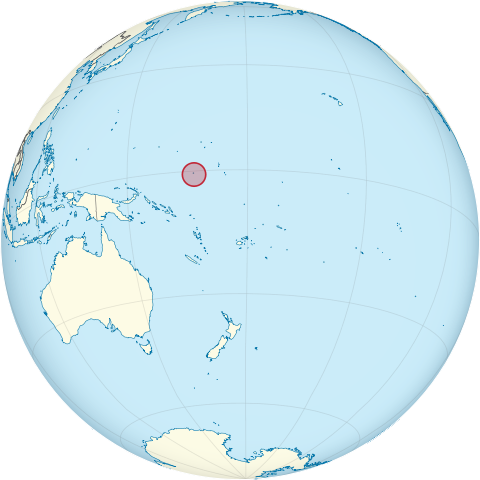Pooped Out

Nauru is the the third smallest country in the world by land area, after Vatican City and Monaco. It’s the second smallest by population, after only the Vatican. Located in Micronesia (it’s encapsulated in the red dot above), it is easy to miss. It is also much smaller — by both measures — than many other islands which are not sovereigns. But most other islands never had the bird guano that Nauru once had.
Yes, guano. Or, more colloquially, bird poop.
Agrarian societies want to maximize plant yields, and, since the mid-1800s, a great way to do that is to add fertilizer to soil. Fertilizer contains, among other things, phosphorus. Phosphorus doesn’t exist as a free element anywhere on the planet because it reacts quickly with other elements, making it hard to come by. But it can be extracted from phosphate rock. Nauru, for a long time, had a lot of phosphate rock, a byproduct of centuries of sea birds doing their business while taking a rest during a trip over the Pacific.
This made Nauru very, very rich. When it obtained its independence from the a United Nations-established coalition of Australia, New Zealand, and the United Kingdom in 1968, Nauruans were already strip mining the phosphate and selling it around the world. Unsurprisingly, especially given the low population, they were able to boast one of the highest per capita incomes of any nation in the world. This was true through the 1970s and into the early 1980s, but things quickly took a turn for the worse — to say the least — as the easily available phosphate rock ran out of the nutrients, with depleted limestone pillars left in their place. With no other natural resource and virtually no tourism industry — the island is hard to get to and it’s made out of rock — the government tried to establish a trust fund from proceeds of the phosphate trade. But bad investments doomed the fund. According to the Asian Development Bank, the fund had about 1.3 billion Australian dollars in it in 1991, but by 2002, the fund’s holdings fell nearly 90% to A$138 million.
And then things got worse. With no obvious source of income, Nauru became an intermediary for criminals; according to Bloomberg, the country was a prime money launderer for the Russian mafia in the early part of the 21st century. After significant international sanctions, Nauru stopped the flow of illicit funds through its banks in around 2007. Since then, it has struggled to find ways to provide goods (almost all of which must be imported) and services to its people. An Australian detention center for refugees held in abeyance operated on the island beginning in 2001, but was shut down by the Australians in 2007. (It reopened in late 2012.) The national bank is insolvent and the government — which does not collect personal income tax — has a difficult time, at best, in providing services to its people.
Only through leveraging their status as a UN member (with voting power) has the nation been able to eke on by. In 2002, the Nauruan government agreed to recognize China (over Taiwan) in exchange for roughly $130 million — only to then change its mind and recognize Taiwan (and keeping the money). In 2008, the island nation agreed to recognize a pair of self-declared republics which attempted to break away from the former Soviet (and now country) of Georgia, to the approval of Russia, which sent them $50 million in foreign aid. These funds, plus aid from Australia, have been the only thing keeping Nauru from abject poverty.
But it isn’t enough. Nauru’s future is bleak, and perhaps hopeless. A reported 97% of men and 93% of women are obese and roughly 50% have diabetes. The CIA World Factbook reports that 90% of Nauruans are unemployed, and the Economist notes that of the small percentage of those who are employed, 95% are on the government payroll.
Bonus fact: One of the bad investments made by the Nauruan trust fund was in a musical titled “Leonardo the Musical: A Portrait of Love.” The musical debuted in London on June 3, 1993, but only lasted five weeks, ending its run on July 10th of that year. It was so bad that, reportedly, on opening night, most of the audience left early.
From the Archives: The Principality of Hutt River: Part of Australia which isn’t.
Related: 2.2 pounds (that’s 1 kg) of sea bird guano. Five stars on three reviews.
